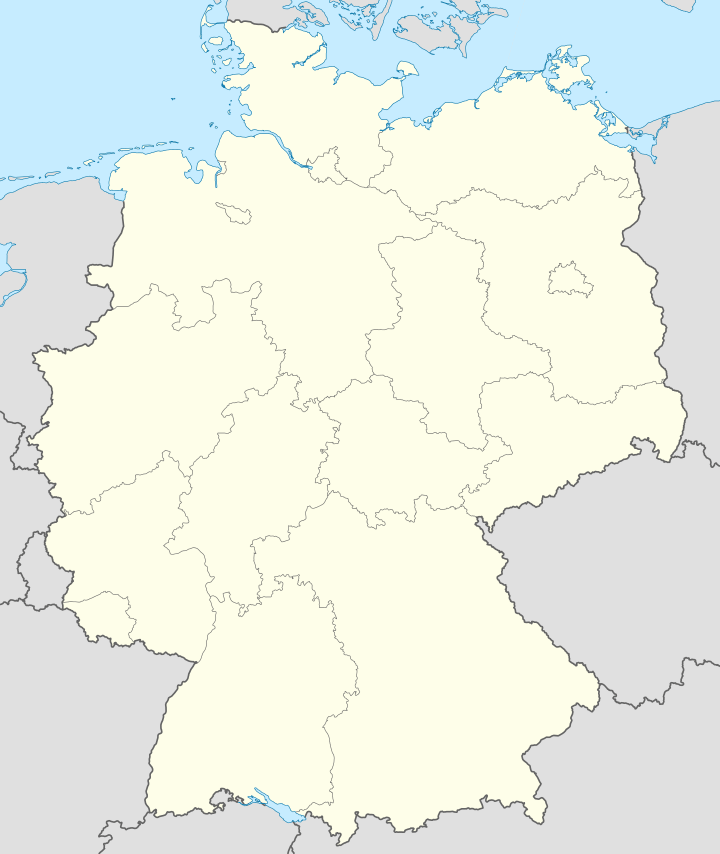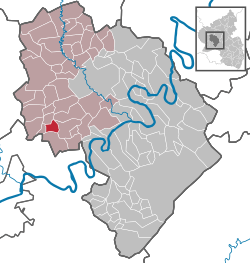Heckenmünster
| Heckenmünster | ||
|---|---|---|
| ||
 Heckenmünster | ||
Location of Heckenmünster within Bernkastel-Wittlich district  | ||
| Coordinates: 49°54′33″N 6°47′16″E / 49.90917°N 6.78778°ECoordinates: 49°54′33″N 6°47′16″E / 49.90917°N 6.78778°E | ||
| Country | Germany | |
| State | Rhineland-Palatinate | |
| District | Bernkastel-Wittlich | |
| Municipal assoc. | Wittlich-Land | |
| Government | ||
| • Mayor | Birger Führ | |
| Area | ||
| • Total | 4.88 km2 (1.88 sq mi) | |
| Population (2012-12-31)[1] | ||
| • Total | 143 | |
| • Density | 29/km2 (76/sq mi) | |
| Time zone | CET/CEST (UTC+1/+2) | |
| Postal codes | 54518 | |
| Dialling codes | 06508 | |
| Vehicle registration | WIL | |
| Website | www.heckenmuenster.com | |
Heckenmünster is an Ortsgemeinde – a municipality belonging to a Verbandsgemeinde, a kind of collective municipality – in the Bernkastel-Wittlich district in Rhineland-Palatinate, Germany.
Geography
Location
The municipality lies on the Meulenwald in the Eifel and belongs to the Verbandsgemeinde of Wittlich-Land, whose seat is in Wittlich, although that town is itself not in the Verbandsgemeinde.
History
About 1231, Heckenmünster had its first documentary mention as villam, que Monasterium appellatur (“village that is called Monastery”). The village belonged to the Duchy of Luxembourg and lay on the border with the Electorate of Trier. Until the 18th century, only a few homesteads here were actually occupied. The Parish Church of the Holy Cross (Pfarrkirche zum Heiligen Kreuz, built in 1744) was the destination for many pilgrims locally.[2]
Beginning in 1794, Heckenmünster lay under French rule. In 1814 it was assigned to the Kingdom of Prussia at the Congress of Vienna. Since 1947, it has been part of the then newly founded state of Rhineland-Palatinate.
Politics
Municipal council
The council is made up of 6 council members, who were elected by majority vote at the municipal election held on 7 June 2009, and the honorary mayor as chairman.[3]
Coat of arms
The German blazon reads: Im schräggeteilten Schild vorne in Silber ein schwarzes Tatzenkreuz, hinten in Silber 4 blaue Balken, belegt mit einem roten, goldgekrönten, wachsenden Löwen.
The municipality’s arms might in English heraldic language be described thus: Per bend argent a cross pattée sable and barry of nine argent and azure a lion rampant couped at the line of partition gules langued and crowned Or.
Mineral springs
Near Heckenmünster are two springs containing carbonic acid (H2CO3), sometimes called Säuerlinge for their sour taste: the Viktoria-Quelle and a sulphur spring called Wallenborn (not to be confused with the Wallender Born, lying some 25 km away). The Romans used the springs for baths, and the water from the Viktoria-Quelle was once bottled and sold. Today, both springs are encased to form fountains, but neither is used commercially anymore. In the valley of the Bendersbach high above Heckenmünster is yet another mineral spring with a high mineral and carbonic acid content, but with quite a low delivery.
References
- ↑ "Bevölkerung der Gemeinden am 31.12.2012". Statistisches Bundesamt (in German). 2013.
- ↑ Additional information from Verbandsgemeinde website
- ↑ Kommunalwahl Rheinland-Pfalz 2009, Gemeinderat
External links
- Municipality’s official webpage (German)
